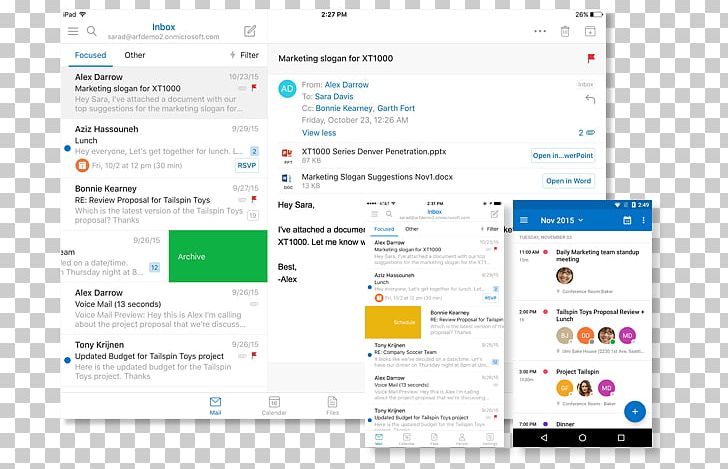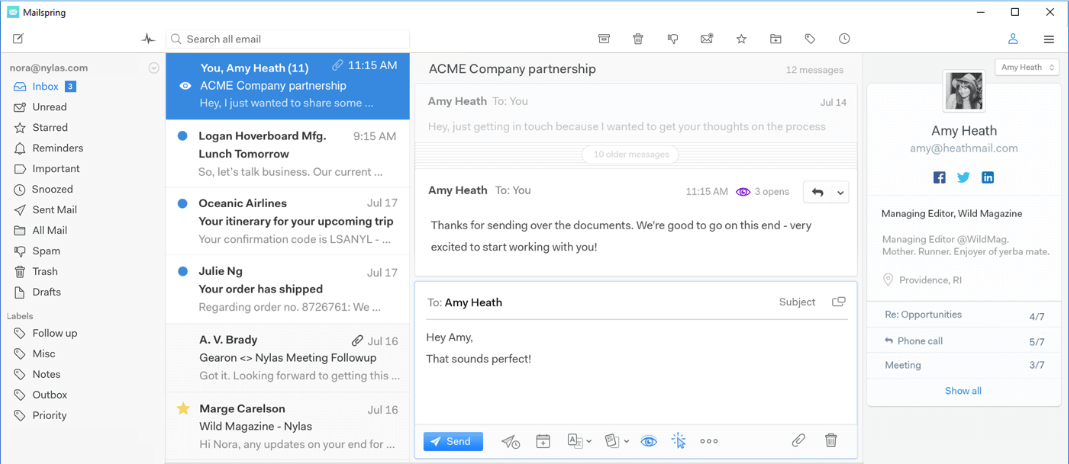
- #Top 10 email clients 2016 Offline#
- #Top 10 email clients 2016 plus#
- #Top 10 email clients 2016 windows#
I have email accounts galore (GMail, Yahoo.TWICE,, and AOL) And it performs regardless of which version of Linux I happen to be on. I've been using Thunderbird for as long as I can remember, and it has never let me down. I had tried it with the current released versions of TBird and Lightning (along with the Google Provider add-on), but it has a severe bug (already known and not anywhere close to being fixed) that it tries to notify you of all past as well as current calendar entries, and the notifications can't be cleared. Would also like to use it for mail *AND* calendaring for my Gmail-hosted work email.
#Top 10 email clients 2016 Offline#
And I want local offline sync of those IMAP accounts.

#Top 10 email clients 2016 plus#
I want something that can support multiple email accounts (at this point they're all IMAP), keep my archived mail (old POP3 versions of a couple of those other IMAP accounts), plus calendar (sync to Gmail, and maybe Cozi as well), decent address book capability (I'm syncing to my Google Contacts these days). So I've been looking around for possible replacement options. And as the client falls behind, add-ons will probably die and become obsoleted by the same sort of API changes as well. My major concern is that Thunderbird may die out, despite it being highly popular, because they simply don't have the staff/resources needed to keep the client viable for the future (bug/vulnerability fixes, API changes at the server end, loss of API support in the tools to build the application, etc). And it prides itself on being fast and reliable, too, in addition to sporting a simple interface that's perhaps ideal for new users.Ĭlaws Mail is based on the GTK+ framework and made available under the GPL. It's flexible, probably more so than Thunderbird or some of the other options in this list, and it has a number of plugins available for those who want to extend it. It's a good option, for example, if you're working within the limited processing and memory capacity of a Raspberry Pi, for example.īut even for those with virtually unlimited computing resources to throw at a mail client, Claws Mail might be a good option. Thunderbird is made available under the Mozilla Public License.Ĭlaws Mail, a fork of Sylpheed, is a fast and flexible alternative that might be appealing to anyone concerned about performance and minimal resource usage. Out of the box, it supports POP and IMAP email syncing, spam filtering, and many other features you would expect, and it works flawlessly across Windows, macOS, and Linux. Thunderbird is full-featured, with a number of well-supported plugins adding everything from calendar support to advanced address book integration, and many specialized features including theming and large file management. Several new hires were made to advance the project, with plans to bring in new developers to fix lingering issues and transform the codebase to be based on web technologies. In recent years, the thunder behind Thunderbird got a little quieter, and in mid-2017 the project announced it would move off Mozilla's infrastructure, but keep the Mozilla Foundation as its legal and fiscal home. Thunderbird has been around for over a decade and was immediately popular from the start, receiving over a million downloads in its first 10 days of public release. It was available on all major platforms, and it had great success alongside Mozilla's now-flagship project, Firefox.


Thunderbirdįor many years, Mozilla Thunderbird was the king of the open source email clients. In this roundup, we take a quick look at six open source options for desktop email, share a little bit about each, and provide you with some options you may want to try yourself.
#Top 10 email clients 2016 windows#
And just because you may be stuck on Windows doesn't mean Outlook is your only option many open source clients are cross-platform. Whether you're sticking with a desktop email client because of a corporate mandate or just personal preference, there are still many great options to choose from. For many, the preference for a native application (and corresponding native performance), easy offline use, a vast array of plugins, and meeting security needs will long outweigh pressures to switch to a webmail email client. Mobile and web technologies still haven't made the desktop obsolete, and despite some regular claims to the contrary, desktop clients don't seem to be going away anytime soon.Īnd with good reason. This article was originally published on October 8, 2015, and has been updated to reflect new information and project changes.


 0 kommentar(er)
0 kommentar(er)
